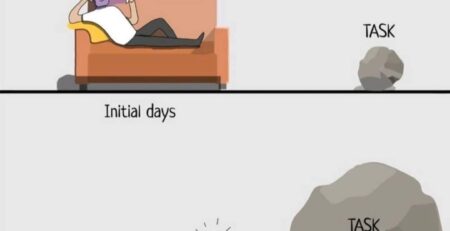Anxiety
Do you Like adventurous sports? Do You Like Suspense stories or Horror Movies? These are common anxiety evoking situations and Still, you like it. Because experiencing anxiety is a normal part of life. Rather its necessary component of optimum performance in life. Anxiety is an emotion that predates the evolution of man.
Each one of us has feelings of anxiety at some point in their life – for example, you may feel worried and anxious about giving an exam, or getting married or job interview. During times like these, feeling anxious can be perfectly normal.
A perceived anticipatory threat to imaginary things is Known as Anxiety. The word anxiety is derived from the Latin “anxietas” (to choke, throttle, trouble, and upset) and encompasses behavioral, affective and cognitive responses to the perception of danger. When people have intense, persistent and problematic fear about everyday situations or imaginary things, then we call it as Anxiety Disorder.
Often, anxiety disorders involve repeated episodes lasting for five to thirty minutes of sudden feelings of intense anxiety and fear or terror that reach a peak within minutes (panic attacks).
These feelings of anxiety and panic interfere with daily activities, are difficult to control, are out of proportion to the actual danger and can last a long time. Symptoms may start during childhood or the teen years and continue into adulthood.
Examples of anxiety disorders include ‘social anxiety disorder’ (social phobia), ‘specific phobias’ and ‘separation anxiety disorder’. A person can have more than one anxiety disorder.
Sometimes anxiety comes secondary to a medical condition that needs treatment. Whatever form of anxiety you have, treatment can help.
Anxiety is an emotion that predates the evolution of man. Its ubiquity in humans and its presence in a range of anxiety disorders makes it important for day to day living of people.
An estimated prevalence rate of 20.7% (18.7-22.7) for all neurotic disorders, which was reported to be highest among all psychiatric disorders. The weighted prevalence rates of different anxiety disorders were 4.2% (Phobia), 5.8% (GAD), 3.1% (Obsession) and 4.5% (Hysteria). (Reddy and Chandrashekhara)
Symptoms
- Generalised anxiety disorder (GAD) can manifest by both physical and mental symptoms.
- Symptoms vary from person to person i.e. they are highly subjective.
- You should visit a Psychiatrist if anxiety is affecting your daily life or is causing you distress.
Psychological symptoms of Generalised anxiety disorder (GAD)
GAD can cause a change in your behaviour and the way you perceive, think and feel about things, resulting in symptoms such as:
- inability to relax
- inner feeling of restlessness
- a sense of urgency
- feeling constantly “on edge”
- difficulty in concentrating
- irritability
These symptoms may lead to social isolation. (seeing your family and friends) to avoid feelings of worry and dread.
Avoidance i.e. withdrawal from day to day responsibilities it can make you worry even more about yourself and increase your lack of self-esteem.
Physical symptoms of GAD:
GAD can also have a number of physical symptoms, including:
- fast or irregular heartbeat (palpitations)
- trembling or shaking
- dry mouth
- excessive sweating
- shortness of breath
- tiredness
- stomach ache
- feeling sick
- headache
- pins and needles
- difficulty falling or staying asleep (insomnia)
When to see a Psychiatrist
See your Psychiatrist if:
- You feel like you’re worrying too much and it’s interfering with your work, relationships or other parts of your life.
- Your fear, worry or anxiety is upsetting to you.
- You feel depressed, have trouble with alcohol or drug use, or have other mental health concerns along with anxiety.
- You think your anxiety could be linked to a physical health problem.
- Your worries may not go away on their own, and they may actually get worse over time if you don’t seek help. See your Psychiatrist, before your anxiety gets worse. It may be easier to treat if you get help early.
Diagnosis
Generalised anxiety disorder as Per International Classification Of Diseases 11th revision (ICD 11)
Generalised anxiety disorder is characterized by marked symptoms of anxiety that persist for at least several months, for more days than not, manifested by either general apprehension (i.e. ‘free-floating anxiety’) or excessive worry focused on multiple everyday events, most often concerning family, health, finances, and school or work, together with additional symptoms such as muscular tension or motor restlessness, sympathetic autonomic over-activity, subjective experience of nervousness, difficulty maintaining concentration, irritability, or sleep disturbance.
The symptoms result in significant distress or significant impairment in personal, family, social, educational, occupational, or other important areas of functioning. The symptoms are not a manifestation of another health condition and are not due to the effects of a substance or medication on the central nervous system.
Treatment
Can be approached individually or in a combination of Pharmacotherapy or Psychotherapy depending on symptomatology and severity of Anxiety disorder.
Pharmacotherapy (Medication)
Some medication is designed to be taken on a short-term basis, while other medicines are prescribed for longer periods.
Depending on your symptoms, you may need medicine to treat your physical symptoms, as well as your psychological ones.
If you’re considering taking medication for GAD, you should discuss the different options with your Psychiatrist in detail before you start a course of treatment, including:
the different options of medication:
1. Duration of treatment:
Probable side effects and possible interactions with other medicines
2. abuse potential of medications:
You should also have regular appointments with your doctor to assess your progress when you’re taking medication for GAD.
Psychotherapy
Cognitive Behaviour Therapy:
Guided Relaxation like Jacobson Progressive muscle relaxation
What Happen If left Generalised Anxiety Disorder Untreated?
Having an anxiety disorder does more than make you worry. It can also lead to, or worsen, other mental and physical health conditions, such as:
Depression (which often occurs with an anxiety disorder)
1. Substance abuse
2. Trouble sleeping (insomnia)
3. Digestive or bowel problems
4. Headaches
5. Suicide
6. Poor quality of life




